Over 30 years of anarchist writing from Ireland listed under hundreds of topics
December 2012
Frank Conroy Commemoration upcoming in Kildare town

A commemoration of Frank Conroy will take place in Kildare town on Sunday December 16th 2012. Frank Conroy came from Fair Green, Kildare town and was an IRA activist who fought with the working class against the fascist Blue Shirts in Kildare and Dublin during the 1930s. Like many Republicans he joined the Republican Congress and Communist Party. Conroy volunteered to fight with Republican leader Frank Ryan in the International Brigade to defend the Spanish Republic against Franco. Organisations attending the commemoration include Eirigi, Workers Party, Workers Solidarity Movement, Tus Nua, the Communist Party and Anti Fascist Action. Main speaker at the event will be Harry Owens.
Growing support for women’s right to choose in latest Abortion Poll
More than one in four people in Northern Ireland support a woman’s right to choose on abortion, an Belfast Telegraph poll has revealed. The findings come from a major survey commissioned by the Belfast Telegraph and carried out by LucidTalk, members of the British Polling Council (BPC). A weighted sample of 1,130 adults was surveyed between November 6 and 23; 90% were questioned by telephone and the rest interviewed face to face.
Beyond the 5 'errors' of the crusade against abortion
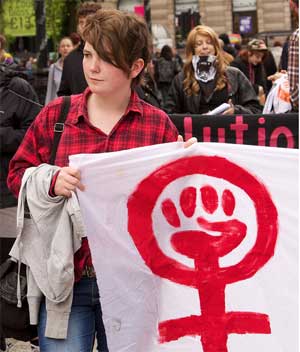 Fintan O'Toole has an article in the Irish Times answering what he describes as the 5 errors of the 'Crusade against Abortion.' I want to go one further and look at what these errors tell us about the methods of those who want to control women's bodies. And more importantly how it is an error for pro-choice activists to allow the debate to be framed through responses to those errors.
Fintan O'Toole has an article in the Irish Times answering what he describes as the 5 errors of the 'Crusade against Abortion.' I want to go one further and look at what these errors tell us about the methods of those who want to control women's bodies. And more importantly how it is an error for pro-choice activists to allow the debate to be framed through responses to those errors.
Let us begin by recognising Fintan is not bringing any new facts to the table, simple assembling the refutations to these claim that everyone who has been following the discussions around abortion in any detail is aware of. This is important because the core point I want to make is that when the various aspects of the so called pro-life movement throw out these claims in interview after interview they already know them to be false. They also know they are relatively easy to contradict, as Fintan has done. So why do they consider asserting them over and over to be effective?
Despite huge spend anti-choice demo attracts only a couple of thousand
 Something in the region of 2000 people who demand that women in Ireland should have to carry to term unwanted pregnancies in any situation organised a demonstration at the Dail this evening. They were trying to prevent the government legislating for abortion in the very limited circumstances of the X-Case - some 20 years after the Supreme court told them such legislation was required.
Something in the region of 2000 people who demand that women in Ireland should have to carry to term unwanted pregnancies in any situation organised a demonstration at the Dail this evening. They were trying to prevent the government legislating for abortion in the very limited circumstances of the X-Case - some 20 years after the Supreme court told them such legislation was required.
Tonights demonstration seems to have united all factions of the anti-choice movement with speakers from both Youth Defence and the Pro Life Campaign. This in itself reveals how paniced they are over the public outrage following the death of Savita after she was denied an abortion in a Galway hospital. The semi spontaneous protests that followed saw well over 25,000 take to the street, over 15,000 on a single demonstration in Dublin alone. A weekend opinion poll showed 85% want X-Case legislation enacted leaving the bigots with a tiny but scary 15% of the population who would sooner see women die than allow abortion.
Counting heads - 1000+ attend 'pro-life' rally
Every now and again something winds you up a little too much and you find yourself being a little obcessive in response. On hearing RTE had reported a daft figure of 8000 as attending tonights anti-choice rally this happened to me. It was very clear this was a massive overestimate but then how to produce an actual calculation of an event in the past. But then the anti-choice movement gave a hand and posted a video of the entire rally, shot it appears from the roof of Buswells.
Political persecution continues in the North
The arrest and detention without bail of prominent Eirigi member Stephen Murney in Newry on bogus terror charges last week is part of a continuous campaign waged by the status-quo and its armed wing against growing dissent in Northern Ireland.
Budget 2013 & the dark times to come
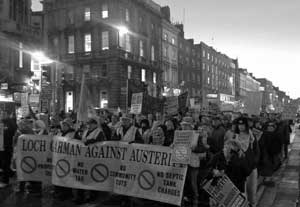 Roughly 1,000 people protested at the Dail last night as yet another austerity budget was debated. As with previous budgets the new flat rate taxes, PRSI & excise hikes will mean workers & those on low income will be hit hard while the richest 1% will hardly notice any difference.
Roughly 1,000 people protested at the Dail last night as yet another austerity budget was debated. As with previous budgets the new flat rate taxes, PRSI & excise hikes will mean workers & those on low income will be hit hard while the richest 1% will hardly notice any difference.
Rethinking Class: From Recomposition to Counterpower
 In Paul Bowman’s article ‘Rethinking Class: From Recomposition to Counter-Power’, he poses the question “Is class still a useful idea?” or “should we instead just dispense with it and go with the raw econometrics of inequality?” He draws a line between revolutionary class analysis and universalist utopianism and goes on to explore the history of different ideas of class and the elusive revolutionary subject. After exploring the intersecting lines of class and identity, he poses the challenge that we as libertarians face as we strive to create “cultural and organisational forms of class power [that] do not unconsciously recreate the... hierarchies of identity and exclusion” that are the hallmark of the present society.
In Paul Bowman’s article ‘Rethinking Class: From Recomposition to Counter-Power’, he poses the question “Is class still a useful idea?” or “should we instead just dispense with it and go with the raw econometrics of inequality?” He draws a line between revolutionary class analysis and universalist utopianism and goes on to explore the history of different ideas of class and the elusive revolutionary subject. After exploring the intersecting lines of class and identity, he poses the challenge that we as libertarians face as we strive to create “cultural and organisational forms of class power [that] do not unconsciously recreate the... hierarchies of identity and exclusion” that are the hallmark of the present society.
Not Waving but Drowning: Precarity and the Working Class

In ‘Not Waving but Drowning: Precarity and the Working Class’, Mark Hoskins takes a critical look at the idea put forward by some academics and even parts of the anti-capitalist movement that the “precariat” is the revolutionary subject of our epoch. After examining the subjective conditions of the precarious subject today and comparing its objective conditions to those of the working class of the last century, he goes on to explore how these conditions relate to our end goal, a communist society and what lessons that can teach us in our attempt to get there.
Failing to unveil Capitalism at Occupy - Paulo Freire’s Theoretical Framework
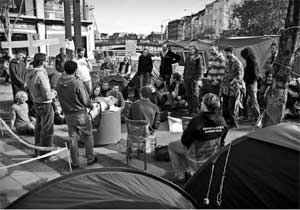 The Occupy movement may have come into our lives just over a year ago with a bang but it went out months later with a whimper. Cathal uses the benefit of hindsight to look at the phenomenon as it manifested itself on these shores and what anarchists could have done to make it work better. The difficulties as Cathal argues did not lie in making arguments for democracy has been the case in so many other campaigns but in that the occupiers “didn’t see this conception extending to the realm of economic production” and in developing the 99%/1% analysis into a deeper class analysis. Recognising problems with current modes of consciousness raising, he utilises Paulo Freire’s pedagogical framework in an attempt to subject “our own political strategies, methodologies and theories to critical scrutiny”.
The Occupy movement may have come into our lives just over a year ago with a bang but it went out months later with a whimper. Cathal uses the benefit of hindsight to look at the phenomenon as it manifested itself on these shores and what anarchists could have done to make it work better. The difficulties as Cathal argues did not lie in making arguments for democracy has been the case in so many other campaigns but in that the occupiers “didn’t see this conception extending to the realm of economic production” and in developing the 99%/1% analysis into a deeper class analysis. Recognising problems with current modes of consciousness raising, he utilises Paulo Freire’s pedagogical framework in an attempt to subject “our own political strategies, methodologies and theories to critical scrutiny”.
Authoritarianism and the early Irish State
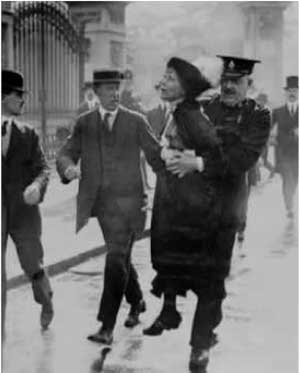 Fin Dwyer looks at the latter years of Ireland’s first post independence government, which having successfully suppressed political opposition and the workers’ movement, went on to “attack women and enforce their moral and ethical values on wider society”. From the clearing of prostitutes from the Monto and the filling of the Magdalene laundries to the institutionalisation of child abuse, he describes how the state’s close association with the Catholic Church played a decisive role in forming attitudes to women and sex that have had a devastating effect on Irish society that can still be felt today.
Fin Dwyer looks at the latter years of Ireland’s first post independence government, which having successfully suppressed political opposition and the workers’ movement, went on to “attack women and enforce their moral and ethical values on wider society”. From the clearing of prostitutes from the Monto and the filling of the Magdalene laundries to the institutionalisation of child abuse, he describes how the state’s close association with the Catholic Church played a decisive role in forming attitudes to women and sex that have had a devastating effect on Irish society that can still be felt today.
Sex and Sex Work from an Anarcha-Feminist perspective
 In “Sex and Sex Work from and anarcha-feminist perspective”, Leticia looks at the theoretical background to the debate between those who argue for decriminalisation and those who “see sex work (or even sex in general) as violence against women”. She argues that because sex is commodified, sex workers should be treated in the same way as others who engage in exploitative labour.
In “Sex and Sex Work from and anarcha-feminist perspective”, Leticia looks at the theoretical background to the debate between those who argue for decriminalisation and those who “see sex work (or even sex in general) as violence against women”. She argues that because sex is commodified, sex workers should be treated in the same way as others who engage in exploitative labour.
Turn off the Red Light: Should we advocate it?
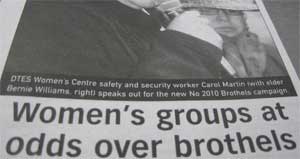 “In Turn off the Red Light – Should We Advocate It?”, T.J., explores the problems faced by sex workers in gaining recognition by those who normally fight for workers rights and outlines how criminalisation of demand has created new problems in countries where that has been introduced.
“In Turn off the Red Light – Should We Advocate It?”, T.J., explores the problems faced by sex workers in gaining recognition by those who normally fight for workers rights and outlines how criminalisation of demand has created new problems in countries where that has been introduced.
New pro choice campaign emerges at well attended public meeting
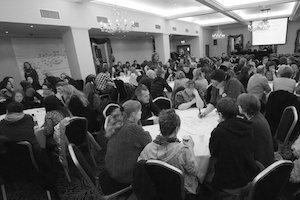 A successful and productive meeting of pro-choice campaigners took place in Dublin city centre Saturday, 8th December 2012. Over 200 people came together in the Gresham Hotel to start building a new campaign for abortion rights in Ireland.
A successful and productive meeting of pro-choice campaigners took place in Dublin city centre Saturday, 8th December 2012. Over 200 people came together in the Gresham Hotel to start building a new campaign for abortion rights in Ireland.
3,000 March in Cork against Household Taxes and Austerity
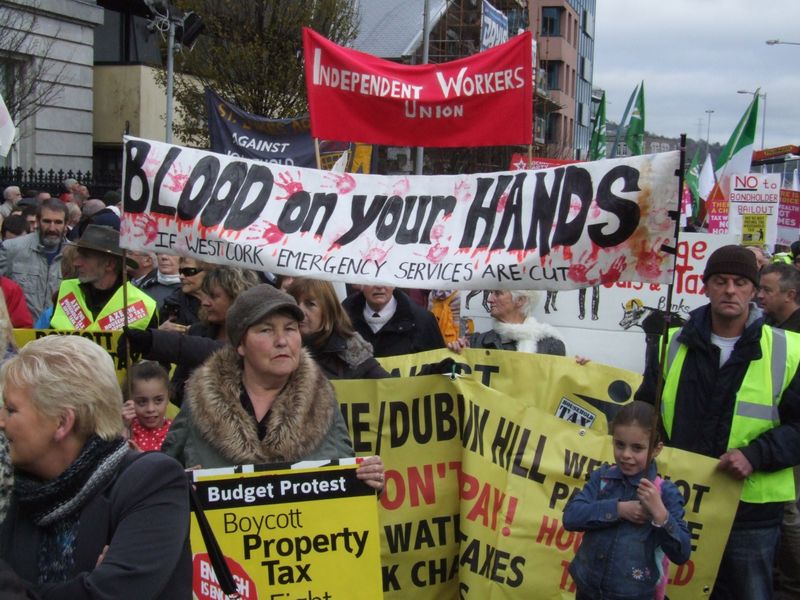
Review Mentioning the War: Essays and Reviews 1999-2011 by Kevin Higgins
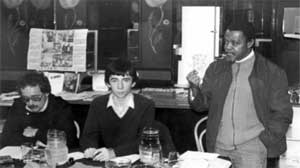 Kevin Higgins is a poet from Galway and a long-standing contributor to the independent left publication Red Banner Magazine. A former member of the Militant Tendency (now the Socialist Party), he has played no small part in making the world of writing a more accessible and pleasant place to be in this country – not least for those who don’t normally find themselves welcome in the hallowed, middle class halls of Literativille.
Kevin Higgins is a poet from Galway and a long-standing contributor to the independent left publication Red Banner Magazine. A former member of the Militant Tendency (now the Socialist Party), he has played no small part in making the world of writing a more accessible and pleasant place to be in this country – not least for those who don’t normally find themselves welcome in the hallowed, middle class halls of Literativille.
Marx’s Economics for Anarchists by Wayne Price
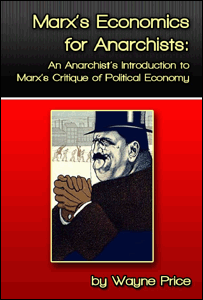 One of the chapters in Wayne Price’s invaluable book is entitled ‘The Capitalist Epoch of Decline’ and it is hard to imagine that we are living in anything else. All of capitalism’s men are rushing around attempting to get the wheels back on the cart that is taking us ever-faster to hell. For many people at this stage it has become obvious that putting the wheels back on does nothing for the ultimate destination.
One of the chapters in Wayne Price’s invaluable book is entitled ‘The Capitalist Epoch of Decline’ and it is hard to imagine that we are living in anything else. All of capitalism’s men are rushing around attempting to get the wheels back on the cart that is taking us ever-faster to hell. For many people at this stage it has become obvious that putting the wheels back on does nothing for the ultimate destination.
Anarchist Studies Network Conference 2: 'Making Connections''
It’s a strange anomaly that anarchism is so marginal an idea in academia despite it being a major influence on contemporary social movement praxis, as well as having been the dominant proletarian ideology worldwide for decades leading up to the Russian Revolution.
Chavs: The Demonization of the Working Class by Owen Jones
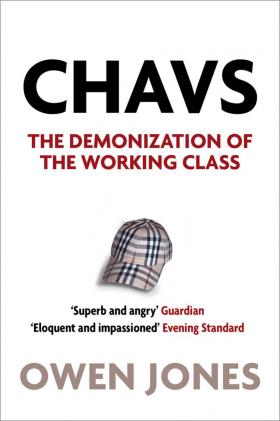 Released in Summer 2011 and now in its second edition, Chavs is Owen Jones' attempt to help rescussitate debate around class within mainstream outdated concept and political discourse.
Released in Summer 2011 and now in its second edition, Chavs is Owen Jones' attempt to help rescussitate debate around class within mainstream outdated concept and political discourse.
Broadly speaking, it is focused on the fate of working class communities in Britain since the Thatcher era and the disappearance of working class political representation, and puts forward some possible ideas to envision a renewed class politics for today. The book has proven a popular one and has propelled its author's public status as a prominent left-wing commentator, and one of the main voices of initiatives to reclaim the Labour Party as a working class organisation.
Brave New North: Neoliberalism in the Six Counties
 Guest writer Liam O’Rourke casts his eye over the neo-liberal project of regeneration in the six counties. He notes that the elite sections of both communities have no problem uniting around what he describes as the “shared non-sectarian identity of the consumer” which reduces shared space to “commercial shared space”. Yet the fact that working class people have seen little of the promised “peace dividend” has not lead to heightened class consciousness so much as it has to increased sectarian division.
Guest writer Liam O’Rourke casts his eye over the neo-liberal project of regeneration in the six counties. He notes that the elite sections of both communities have no problem uniting around what he describes as the “shared non-sectarian identity of the consumer” which reduces shared space to “commercial shared space”. Yet the fact that working class people have seen little of the promised “peace dividend” has not lead to heightened class consciousness so much as it has to increased sectarian division.

